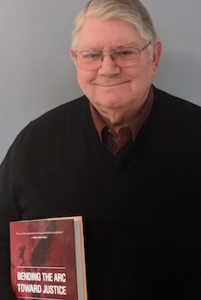Hate has re-emerged as a major issue in America today.
Examples abound. Police violence and the Black Lives Matter movement. The January 6 Capitol insurrection. A resurgence in white supremacy and anti-Semitism. Violence and discrimination against immigrants. The resent spike in anti-Asian violence – 150% increase in the last year. Six Asian women in Asian businesses killed in Georgia last week.
And now, much closer to home, the threats and violent acts against Mike and Helen Wong, owners and proprietors of the Oriental Wok restaurant in Ft. Mitchell, and their family and employees.

Col Owens
Why?
Hate derives from fear and anger. Fear of the other, of what is unknown, outside our experience. Fear of not obtaining what we aspire to – and fear of losing what we have. In good times fear recedes. In hard times it escalates.
And anger. Anger derives from not doing well, or perceiving that one is not doing well. And resenting those perceived as hurting us, of taking unfair advantage, through affirmative action or “welfare,” various forms of public assistance put in place to help those in need.
Fear and anger often lead to scapegoating, identifying those who we believe are cheating us, winning unfairly, taking our jobs. We cannot stand the idea that we are on the bottom. There must be people below us on the social and economic scale for us to feel at all good about ourselves.
Some anger is traditional, such as anti-Semitism, or racism, or xenophobia. Former President Obama’s election was followed by a resurgence of racism. Other examples are of more recent vintage, such as the explosive growth in white supremacy activity and anti-Asian hate.
The sources that feed hate are transparent. What we observe. Who is doing well, who is doing better than us. We learn either by direct observation or through the media. Today the reliability of the media is complicated by heightened distrust of it, on all sides. Fake news charges abound.
This leads to the second major source of sowing and feeding hate: what we hear from important people, especially leaders. There has been abundant evidence in recent years that words matter. Greatly. There can be little doubt that former President Trump’s constant references to the China flu with respect to the coronavirus are directly correlated with the 150% increase in anti-Asian violence this past year.
So we turn to the question of remedies. What can make a difference? What can diminish the strong feelings that perpetuate hatred and violence?
Certainly, the teachings of our religious traditions are starting places. For Christians, the parable of the Good Samaritan, and the numerous Gospel admonitions to love our neighbor, to clothe and feed and heal those in need, to embrace the stranger. Other traditions have similar teachings.
But we know that what counters media messages and the words of personalities and celebrities most effectively is personal experience. Knowing a person of the “other.”
This is why suburban Kenton County, and especially Ft. Mitchell, virtually exploded with outrage over the attacks on the Wong family and their business at Oriental Wok. People know the Wok, love the Wok, and many patronize it regularly. My family celebrated numerous significant events there. It was my parents’ favorite restaurant.
Mike Wong and his family always make us feel special. They make all of their customers feel special. They are known and loved.
Thus, we are horrified at the idea that some would threaten them or do harm to their property.
There is an important lesson here. As the Gospel says, those who have ears, let them hear. To reduce hate we must reach out. To minister to victims. To establish personal relationships with members of the victimized class. Relationships like those that impact the Wong family situation so significantly.
And finally, to those most difficult – the haters. Because relationships matter there as well – in some ways, most of all. We change the world through policy, yes – but in the end, we change it most through love. Not abstract love, but actual love of real persons. One on one.
We need to get more serious about combating hate.
Col Owens is a retired legal aid attorney. He teaches poverty law at the Chase College of Law at NKU. His recently-published book, Bending the Arc Toward Justice (Cincinnati Book Publishing, 2020), is available for purchase at colowensbooks.com.
















